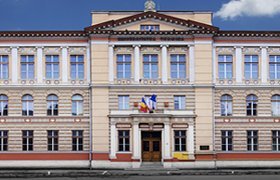Deschidere modul căutare
Închidere modul căutare
"High degree of trust" - ARACIS (2013 - 2018)
"University of Advanced Research and Education" - Education Minister Order nr. 5262 of 5.09.2011

The technical education goes back to the beginning of the 19th century on the firmament of the cultural values of Cluj-Napoca. The unification of the Romanian provinces into a single state, on December 1st 1918, opened new perspectives for education. On February 1st 1920 the Industrial College was founded in Cluj-Napoca, and afterwards a series of reorganizations, becoming the College for Technical Conductors in 1922. It was the only college with a major in electrical engineering in the country and the precursor of the Cluj Polytechnic Institute.
Another technical college founded in 1920 was The College for Conductors of Public Works, specializing in roads and bridges, the precursor of the Faculty of Civil Engineering. In 1937, the College for Technical Conductors, which had an excellent reputation within the Romanian industry, was reorganized as The Electromechanical College.
In 1947, following a memorandum addressed to the Romanian Ministry of National Education regarding the establishment of a Polytechnic university in Cluj with three faculties: Constructions, Electromechanics and Forestry, the Law on Education Reform of August 1948 created the Institute of Mechanics from Cluj, having a faculty with two sections: Thermotechnics and Machines. The increasing need of technical specialists helped the Mechanics Institute turn into the Cluj Polytechnic Institute in 1953.
After the 1989 Revolution, the Romanian higher education came back to the former tradition correlated to the Western system. In 1992 the Polytechnic Institute was renamed to the Technical University of Cluj-Napoca, and the three existing faculties at that time were restructured into seven faculties: Automation and Computer Science, Electronics, Telecommunications and Infirmation Technology, Electrical Engineering, Civil Engineering, Machine Building, Mechanical Engineering, Material Science and Engineering (which became in 2011 Materials and Environment Engineering), as well as the Technical, Economical and Administration College. In 1998 the structure of the Technical University of Cluj-Napoca was completed with the Faculty of Architecture and Urban Planning, and in 2007 with the Faculty of Installations.
Since 2012, the Technical University of Cluj-Napoca has twelve faculties following the merger with the North University of Baia-Mare, which became the North University Center in Baia-Mare, comprising the Faculty of Engineering, the Faculty of Letters and the Faculty of Sciences.
Starting with 2003, the Technical University of Cluj-Napoca has been accepted as a member of the European University Association (EUA) and in 2007 it was accepted in the Francophonie University Association (AUF).
The results obtained in the teaching activities, research, university management and international cooperation, as well as in the activity of improving the quality of education according to European standards of the Technical University of Cluj-Napoca, were appreciated by the Romanian Agency for Quality Assurance in Higher Education (ARACIS), which, in 2007, awarded the university the "High Trust Degree”. The Technical University of Cluj-Napoca presents itself today as a state-of-the-art modern higher education institution, confirming the authentic scientific and cultural creation, being an "Advanced Research and Education University" among the first twelve universities in the country, according to the Order of the Romanian Ministry of National Education no. 5262 of 5 September 2011 on the classification of accredited universities in the national education system.